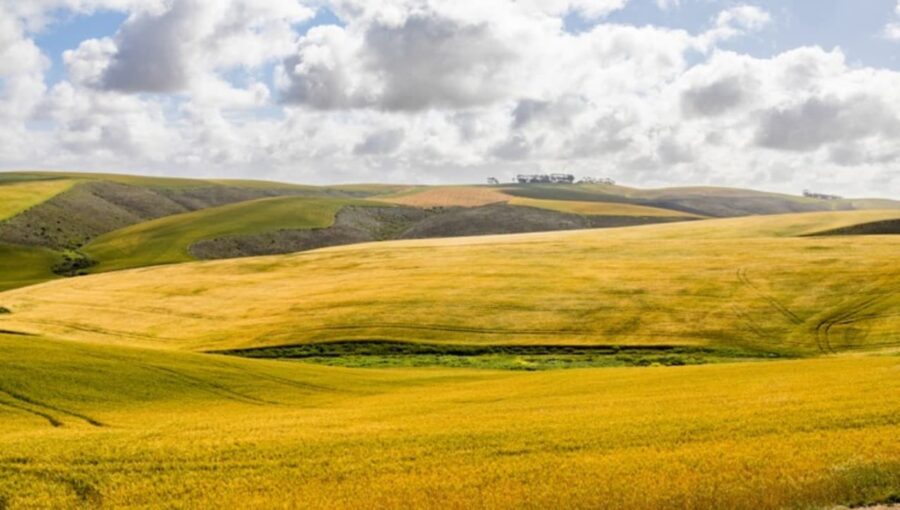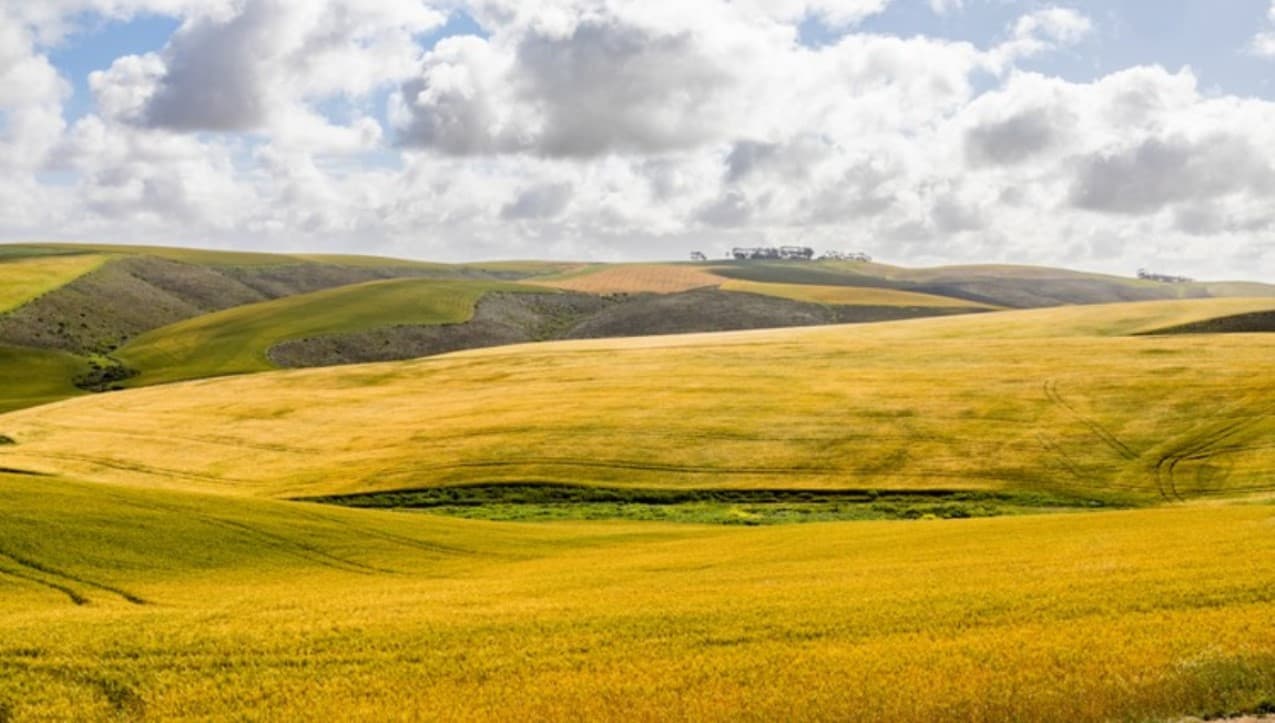
Gold mining in the Overberg: fears relieved for now
Mining company has not met the first deadline for an Environmental Impact Assessment

Farmers, conservationists and winemakers in the Overberg, Western Cape, have won at least a temporary reprieve in their battle to prevent what they see as the possibility of a vast open-cast gold mine being carved into their rolling hills.
- About six months ago a company called Cienth filed an application to prospect for gold and other metals in the Overberg, Western Cape.
- The application outraged local farmers and winemakers who feared a massive open-cast mine in this important agricultural region.
- However the company has not met its first deadline for an Environmental Impact Assessment, and its application has as a result lapsed.
- However, this has happened before and Cienth may try again.
About six months ago, a shell company called Cienth, which has a single director appointed in April this year, filed its first application for a prospecting licence to look for gold, silver and tin in an area of 4,200ha, about 15km from Napier village.
Residents of the area were outraged, saying that if the project graduated from prospecting to actual mining, livelihoods would be destroyed, groundwater would be contaminated and endangered renosterveld – including important wetlands –would be devastated.
But this week the environmental consultant hired by Cienth to conduct the environmental impact assessment (EIA), McDonald Mdluli of Lwethuma Environmental Consultants, said the company had suspended the application.
“It’s been put on hold,” Mdluli told GroundUp. “The applicant is not proceeding with it. So all the processes have ceased now. … If they decide to revive the application, they will have to relaunch with the DMRE, and the whole process will have to start afresh.”
He said Rosy Mvala, sole director of Cienth, had made the decision “not very long ago”.
Asked if Mvala had given him reasons, Mdluli said one of the main problems was that he had not had enough time to meet the first deadline in the EIA process, which is on 23 November. Cienth had only appointed Lwethuma some time after it lodged its second application for a permit with the Department of Mineral Resources & Energy (DMRE).
“On our side, we just got appointed, there was a lot of work to be done … The application had already been lodged, so the timeframe was a bit compromised. That was one of the many reasons.”
But Elsaine Rabie, an environmental lawyer hired by the Napier Farmers Association to advise them, said she feared Cienth would lodge a fresh application sooner or later.
“[Mdluli] confirmed, telephonically, that they are in the process of withdrawing the matter but … it must be done formally,” she said. “So I assume they are just waiting for the timeline to lapse.”
This is what happened with Cienth’s first prospecting application, which involved a different environmental consultant.
Under the regulations governing such applications, Lwethuma would have had to file a final basic assessment report (DBAR) by 23 November and failure to do so would automatically abort the application.
The process might be on hold, Rabie said, “but they will submit a new application. This is the second application already. This is going to be a very lengthy battle.”
She said none of the interested and affected parties had received plans, diagrams, a prospecting works programme, or specialist reports, so they had nothing on which to comment for the DMRE.
Mdluli said he had received no instructions from Mvala about lodging a new application, and if she did decide to do so, she would not be compelled to use Lwethuma again.
Secrecy
The central mystery in the saga is who is backing Mvala and Cienth, and why they want to look for gold in an area where it seems highly unlikely to be found.
According to company records, Mvala, who is only 29 years old, is the director of 90 companies and is based in Kimberley. She is listed as having been appointed a director of all but three of the companies in 2023.
Mvala and her geological consultants, Minrom, led by CEO Oscar van Antwerpen, have wrapped a shroud of secrecy around the Overberg prospecting bid.
Messages left for Mvala and her predecessor as Cienth director, David Silver, at the shell company’s registered premises — an apartment in Sandton — drew no response.
Asked for his views and comments on the project, Van Antwerpen said by email: “We cannot answer that at this stage.”
Van Antwerpen, who lists his previous employers as including Northam Platinum and Billiton, was quoted by Engineering News as saying, in a profile piece earlier this year, that the person he most wanted to meet was Sadhguru — an Indian mystic who runs self-improvement programmes.
The only substantive contact Overberg residents have had with Van Antwerpen and Mvala was at a meeting that Cienth and Minrom held with officials of the Cape Agulhas Municipality (CAM) in Bredasdorp in September — and that was only because CAM invited representatives of the farmers’ association to attend.
“The applicant and Minrom felt a bit ambushed,” said Rabie, who attended the gathering. “It got very heated. It was hectic.”
Wynand Wessels, chair of the farmers’ association, was also there. “Oscar was the hell in for Raymond Ross [a local DA councillor] that he had allowed us to attend,” he said.
Wessels said Mvala made a prepared speech at the meeting, but once other attendees started asking her questions, she was immediately out of her depth.
“Oscar answered the questions instead. He was very condescending, as though we didn’t know what we were talking about.”
Wessels told GroundUp that since September the farmers’ association had not been able to contact Mvala. “It’s their strategy not to answer emails or phone calls, she has disappeared like mist before the sun.”
He said the threat of prospecting would not go away soon. “Nothing stops them from just lodging a new application.”
One journalist attended the Bredasdorp meeting in September, from the local newspaper Suidernuus, and according to a recording she made, Van Antwerpen said at one stage: “The more you write about this in the newspaper, the more you make people attentive of what is going on. That’s why I ask you to hold back on newspaper articles. I’m giving you a hint, I’m being friendly. Stop writing about it in the newspaper because you’re going to cause a gold rush.”
A source in the municipality also told GroundUp that Mvala had said she did not want publicity because it would alert rival companies to the possibility of gold in the area, and they would launch their own prospecting bids.
“Smoke and mirrors”
But that was absurd, said a local geologist and veteran of the gold mining industry who asked not to be named.
He told GroundUp there was no reason to think there was gold in the Overberg, and Cienth would struggle to persuade investors to put any money into the project.
“I don’t know what evidence these people [Van Antwerpen and Mvala] have, but I can’t see it.
“I do mineral prospecting in central Africa, I know what to look for. Always where there is copper, gold, tin, there’s lots of evidence. Prospectors doing shafts, adits, over time. Now we come to the Overberg where nobody has done anything. Surely that tells you there’s actually nothing to be found.”
He said in 1996 he had personally taken samples from an adit — a near-horizontal mine shaft — that was dug in the 1880s on a farm near Napier in the hope of finding gold.
“I took a few samples and they were all negative. You would expect that if there was any potential, the adit would have shown something, but it didn’t show anything, so I thought it’s just an early scam. And I thought nothing of it until suddenly this whole new noise comes about this prospecting application.”
He said he expected the prospecting plan would come to nothing.
“I suspect the secrecy is smoke and mirrors, because there’s not a lot behind it. That’s probably more the reason, that they haven’t got funding … In global exploration there’s not huge pots of money willing to bet. This is like a 10,000-to-one outsider, people are not going to put money into it.
“There’s obviously some sort of dodgy sort of speculative stuff behind it, so part of the thing is to create secrecy because the reality is pretty depressing.”
Locals plan to fight mining interests
A wine maker from the area, Jack Bruce, is more pessimistic — he cites statistics that nearly 90% of exploration licences result in mining licences and says that because gold grades in the area are so low, a huge open-cast mine of about 300ha would be needed to make the deposit pay.
“The likelihood is it’s going to be humongous, probably the biggest open-cast mine in the Western Cape bar the West Coast sand mines,” Bruce said.
Bruce is a member of the Agulhas Wine Triangle, a group linking wine-makers in the region include Zoetendal, Strandveld Wines and Black Oystercatcher, among others. The wine group has joined the Napier Farmers’ Association and the Overberg Renosterveld Conservation Trust in moves to form an anti-exploration alliance with a legal structure, so they can raise funds to fight what they fear will be prolonged legal battles.
“Who wants to taste wine next to a mine?” says Andre Morgenthal, project manager for the wine triangle group.
But the geologist GroundUp spoke to says there’s no potential for a large-scale mine.
“I’ve got no idea what gives [Minrom and Cienth] grounds for optimism.”
“It’s all part of the Cape Fold belt, the age of the rocks is about 400 million years and you think, ‘Wow that’s old,’ but you look at the Witwatersrand and that’s almost three billion years old. Gold deposits are mostly found in far older rocks.
ALSO READ: Here’s how government could slash fuel prices in SA … but doesn’t
“It’s really hard to raise money for exploration these days, even despite the high price of gold. In this case … the whole venture will slowly die,” he said.
“They’ll have to find something pretty bloody amazing to justify it going forward, they’ll have to find the new Klondike [a big gold rush in North America].”
